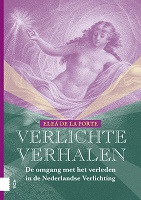Verlichte verhalen
De omgang met het verleden in de Nederlandse Verlichting
Author(s)
de la Porte, Eleá
Collection
Dutch Research Council (NWO)Language
DutchAbstract
By describing their present as ‘enlightened’, eighteenth-century intellectuals inevitably altered their relationship to the past. In search of an explanation for this Enlightenment, eighteenth-century authors created a historical narrative which connected European countries in a linear history from antiquity, through the barbarous Middle Ages, to the progress of the scientific revolution and, finally, to the enlightened present in which seventeenth-century knowledge was perceived as increasingly benefiting society as a whole. Even though this narrative served as a shared European history and identity, national varieties soon emerged.
This book shows that, in the context of the European ‘Enlightened narrative’, the Dutch Republic formed an extraordinary case. Here, the narrative of progress collided with a simultaneous debate on national decline and a deeply rooted humanistic tradition. Dutch intellectuals, moreover, were forced to reconsider their national past and national identity. The Batavian myth, for two centuries the primary historical foundation of national identity, increasingly came to be viewed as ‘barbaric’. Consequently, the concept of a seventeenth-century Golden Age was invented. It replaced the Batavian myth with a celebration of seventeenth-century Dutch economic prosperity, commercial politeness and moral rectitude more in line with enlightened historical thought.
Keywords
Enlightenment - Dutch Republic - History of Historiography - 18th Century - Intellectual History - Enlightened Narrative - National IdentityDOI
10.5117/9789463720083ISBN
9789463720083, 9789048556151Publisher
Amsterdam University PressPublisher website
https://www.aup.nl/Publication date and place
Amsterdam, 2023Classification
Dutch
18th century, c 1700 to c 1799
Literature: history and criticism


 Download
Download